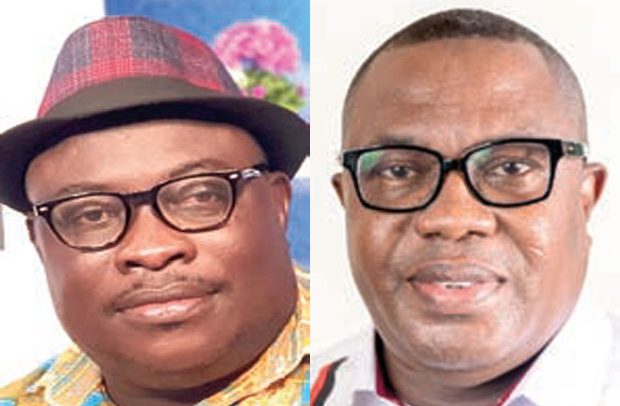Kwaku Boahen, Samuel Ofosu-Ampofo
AN ACCRA High Court has ordered the immediate former National Chairman of the opposition National Democratic Congress (NDC), Samuel Ofosu-Ampofo and a Communication Officer of the party, Kwaku Boahen, to open their defence in a trial in which they are accused of planning to assault the Chairperson of the Electoral Commission and others.
The court, presided over by Justice Samuel Asiedu, a Supreme Court judge sitting as an additional High Court judge, gave the order after it held that the prosecution had proved its case against the two, hence they ought to give their side of the story.
The order followed the court’s decision in applications for submission of no case filed by counsels for the accused persons filed in November last year after the prosecution closed its case, arguing that the prosecution failed to establish the allegations against the accused, hence they had no case to answer.
But the court in its ruling rejected the arguments of the defence lawyers and held that the prosecution had made a prima facie case against the accused persons, and subsequently ordered them to open their defence on February 10, 2023.
Trial
Mr. Ofosu-Ampofo and one of the party’s leading communicators, Anthony Kwaku Boahen, are on trial over the tape which captures how the opposition NDC is allegedly planning to commit crimes in the country and turn round to blame them on the ruling New Patriotic Party (NPP).
Among the strategies were the creation of a general state of insecurity in the country through kidnappings, arson and verbal attacks on public officials like the Chairman of the NPC, Prof. Emmanuel Asante, and EC boss, Jean Mensa.
Mr. Ofosu-Ampofo has been charged with one count of conspiracy to cause harm and two counts of assault against a public officer.
Mr. Boahen, on the other hand, is facing one count of conspiracy to cause harm.
Tape
The controversial tape which is the subject of the trial was tendered in evidence by the case investigator, Detective Chief Inspector Bernard Berko, in his evidence-in-chief by the Director of Public Prosecution (DPP), Yvonne Atakora-Obuobisa.
The over two hours tape which was recorded at a meeting of NDC communicators somewhere last year or so, had Mr. Ofosu-Ampofo telling the party members to make life uncomfortable for the targeted persons who included the Chairpersons of the Electoral Commission (EC) and National Peace Council (NPC).
The leaked tape also detailed how the party would approach campaign strategies, including what he described as ‘overt’ and ‘covert’ operations in the wake of the disturbances that characterised the Ayawaso West Wuogon bye-election.
“I want to assure you that as long as I remain the leader of our party, my approach to elections and security has completely changed… and we need to marshal all the human and material resources,” Mr. Ofosu-Ampofo stated when he took his turn to address the party faithful as captured on the tape.
Forensic Examination
A forensic examination conducted on the leaked audio tape has confirmed it to be his voice on the tape.
The examination which was carried out by the Israeli Forensic Science Institute was to compare the controversial tape to another voice recording of the NDC guru when he addressed supporters of the party at the Police Headquarters in Accra after he was granted police enquiry bail.
According to the report, there is 90 per cent probability that the voice of Mr. Ofosu-Ampofo on the tape addressing the party faithful is the same as the voice on the leaked tape.
The report also indicated that “There is also 85 per cent probability of coincidence of speech features and defects.”
Alibi
Chief Inspector Berko also told the court that while the matter was in court, Kwaku Boahen pleaded an alibi that he was in Bomfa Achiase in the Ashanti Region on February 3, 2019, when the said meeting was held at the NDC headquarters in Accra.
He said a team was constituted to investigate the alibi, and a report was produced after the investigations.
By Gibril Abdul Razak


